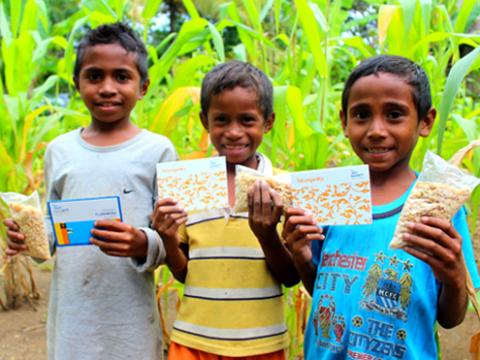Tempeh sends our children to school

It's a small traditional house in Oelneke, a village in North Central Timor, Indonesia where the women meet every afternoon. They are busy with the soybeans- washing, drying and packing them into something different: tempeh - a low-cost, nutritious traditional dish made of fermented soybeans. Tomorrow, a seller will come and sell their fresh tempeh at the nearest market.
Although tempeh is very popular in Indonesia, the tempeh from Oelneke is different because it's free from any preservatives. That's why Oelneke-tempeh tastes fresh and delicious. The tempeh that the women make is sold out every day. With many good consumers, the women get more enthusiastic about their business everyday.
The tempeh business in Oelneke started in 2013 when World Vision Indonesia started to assist the village. Most of Oelneke villagers worked as farmers at that time. As farmers, they didn't have enough money to send their children to high school. They needed a solution to escape from poverty. Through tempeh production, the farmers have found a way out. World Vision worked with Department of Industry, Commerce, and Cooperative in North Central Timor trained the group to produce their own tempeh.
"We choose to start the tempeh business because tempeh is easy to make and also nutritious. Many people like to eat tempeh every day," said Yohanes, 56, the chief of Oelneke Farmer Group.
World Vision also funded the group to buy soybeans and open their business. Through regular training, the women have successfully made their own tempeh. Each tempeh is sold for different price. The small tempeh will be sold for 3,000 rupiahs (about .22 cents U.S.) and the bigger one will be sold for 5,000 rupiahs (about .37 cents U.S.).
The tempeh business has brought so many advantages for the villagers especially the children of Oelneke. From the tempeh business, the mothers can save some of the money in an Education Saving fund. Each save 10,000 rupiahs per month for their children. In the end, they can use this saving for sending their children to high school.
"Now I hope I can send my children to university," said Maria.
*Written by Rena Tanjung, Field Communications Officer, World Vision Indonesia